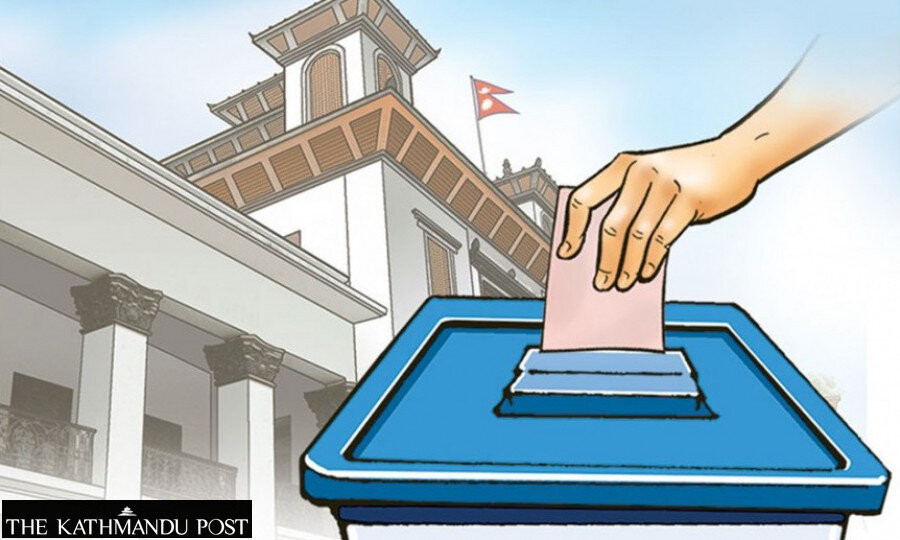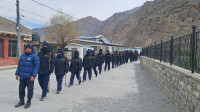Politics
Higher vote threshold for political parties will be hard to set, analysts say
Election authority working to amend law on political parties but revisions not yet known.
Purushottam Poudel
Following the formation of a new government led by KP Sharma Oli, chairperson of the CPN-UML, party general secretary Shankar Pokharel has been advocating the need to amend the vote threshold, a legal three percent bar that a political party must cross to be deemed a national party.
Claiming that the low bar of votes has resulted in political instability by helping a big number of parties enter Parliament, Pokharel is calling for a higher percentage of votes for a party to enjoy a share of the proportional representation (PR) seats.
It is inappropriate for the parties that secure just one-and-a-half percent votes to be eligible for PR seats in the provincial assembly and those that win only three percent to secure their proportional seats in the federal parliament, Pokharel said in Dang on July 30. “So we should increase the threshold to 10 percent.”
The Nepali Congress and the UML, two biggest parties in the House of Representatives, agreed to lead the government by turns after they ousted the third largest party, CPN (Maoist Centre), which had been leading the administration after the November 2022 election.
The two biggest parties in the country teamed up to install a new coalition, in an unusual democratic exercise.
Political observers say one big reason the two parties came together was to install a two-party system.
“It was with political consensus that we kept a three percent threshold in our constitution,” Krishna Pokharel, a professor of political science, told the Post. “Our constitution only recognises a multi-party system.”
People’s Multi-party Democracy, an ideology propounded by the late UML general secretary Madan Bhandari, also does not recognise a two-party system, he said.
If the Congress and the UML bring in a two-party system, it will further worsen the country’s political climate, the political scientist said.
The Congress and the UML are said to have an understanding to amend the constitution so that only a few parties are represented in the provincial assemblies and in the federal parliament. They are also said to be in favour of proportional representation from the House of Representatives.
For that, the constitution needs to be amended. As amending the constitution is a complex process, there are instead plans to amend laws related to the political parties, claims a Maoist Centre leader.
By amending such laws, the Congress-UML coalition wants to take the country to a two-party system, Maoist Centre leader Lekhnath Dahal told the Post. “However, we will make sure that does not happen.”
Ram Datta Pandey, assistant spokesperson for the Election Commission, said they are working to amend the laws related to political parties.
The commission has discussed the matter with various stakeholders, Pandey told the Post. “It is still unclear whether we will change the threshold provision while amending the laws related to the political parties.”
Pandey added that since changing the vote threshold percentage is a political issue, the commission alone cannot do it.
Dahal of the Maoist Centre claimed that the two major parties reached a seven-point deal before forming the Oli government on July 1—a document that is yet to be made public.
“Prime Minister Oli read out seven points of an agreement during his floor test on July 21,” Dahal said. “But why has he not made public the original paper with the signatures of the two leaders?”
Congress President Sher Bahadur Deuba and UML chair Oli signed an agreement days before the UML withdrew its support to the Pushpa Kamal Dahal government on July 3.
Increasing the threshold would be a regressive move, says a rights activist. Democracy gives all political parties the space to grow, Govinda Chhantyal, a long-time advocate for greater representation of ethnic groups, told the Post. “In our current federal structure, the Centre should be helping the regional parties to flourish instead of trying to snuff them out.”
The two-party system cannot guarantee political stability, as the leaders of major parties advocate, Chhantyal argues. “If that were the case, why would the Nepal Communist Party, which had nearly a two-thirds majority after the 2017 election, fail to bring stability to the country?”




 17.15°C Kathmandu
17.15°C Kathmandu















